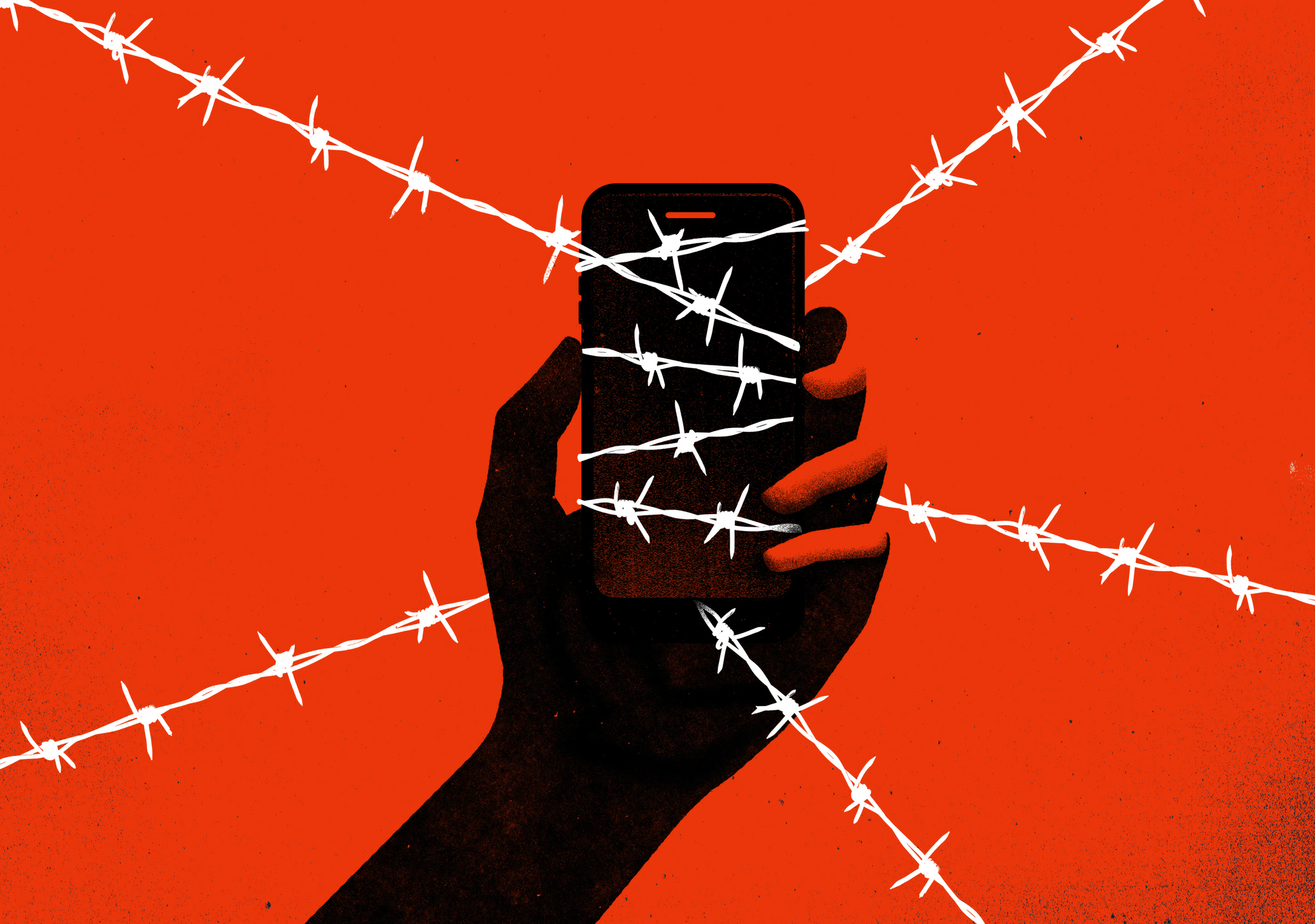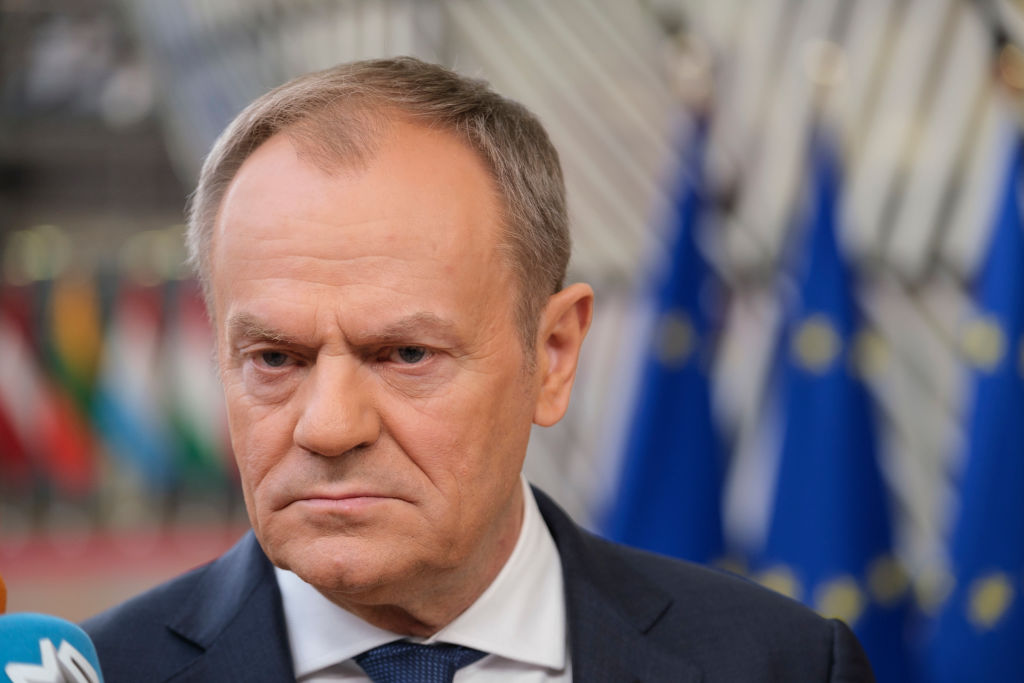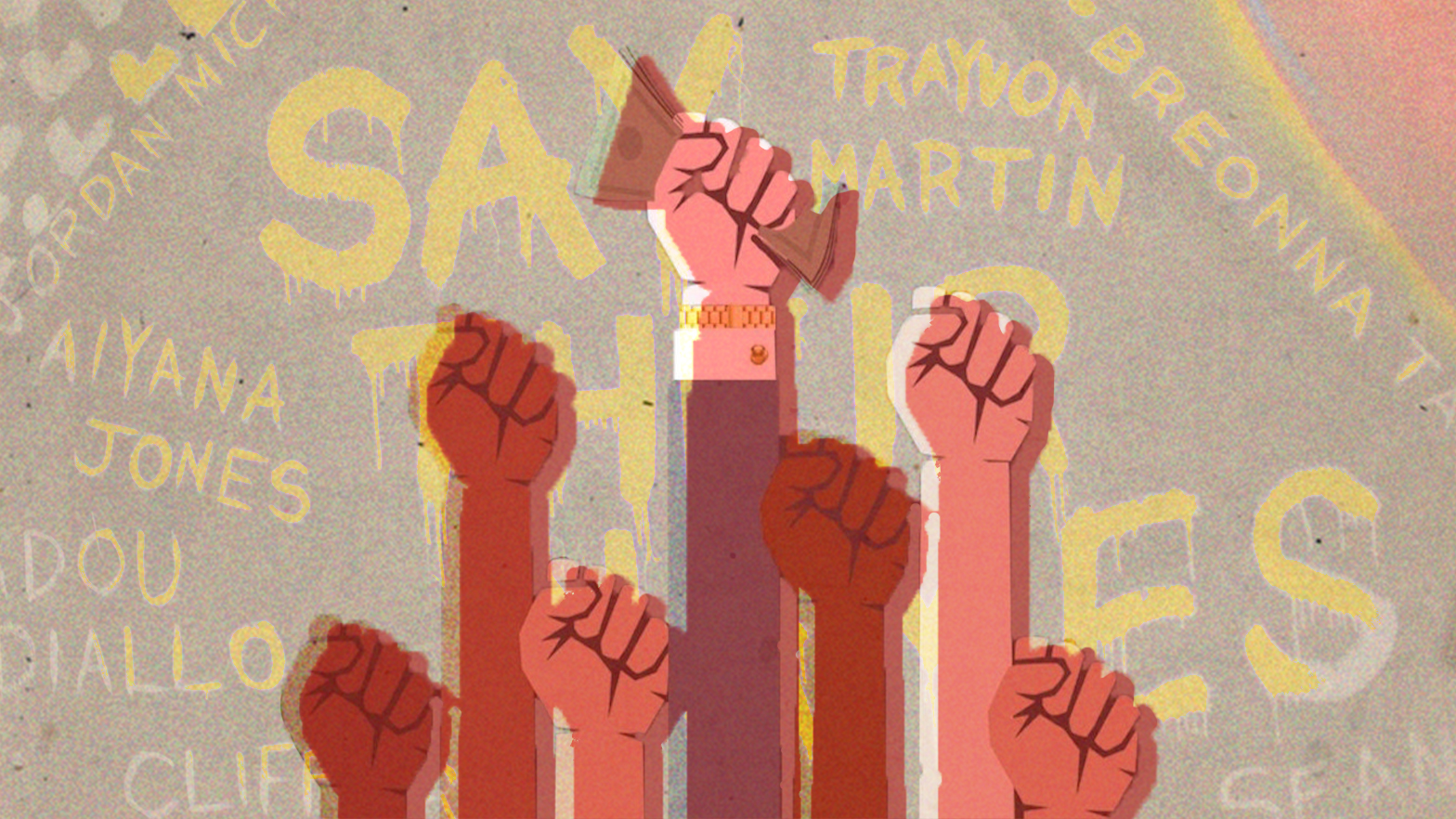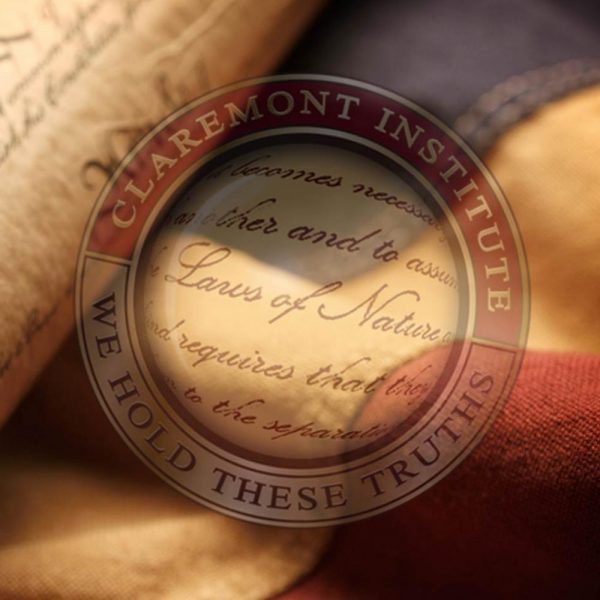Donald Tusk’s coalition government represents the authoritarian face of the new “anti-authoritarian” movement.
“It’s Afraid”

Both the Left and Right are targeting anonymous users online—and ultimately free speech.
“Anonymous users are dominating right-wing discussions online,” ran a headline at the Associated Press a week ago. “They also spread false information.”
The story focused on the spread of a claim about voter registration in key election states. According to an anonymous user on Twitter whom the AP declined either to name or to link, huge numbers of voters are registering in those states without the use of photographic ID, providing social security numbers instead. The implication is that this is a prelude to large-scale voter fraud of the kind that obviously didn’t take place during the 2020 election and could only take place in countries that aren’t America. Especially countries whose rulers the State Department has decided it doesn’t like: places like Venezuela, Uganda, and Russia.
The offending tweet went viral, and pretty soon X/Twitter’s billionaire owner, Elon Musk, was pitching in. “Extremely concerning,” he replied. So concerned was Musk about the claim that he came back later to reply for a second time. “Extremely concerning,” he posted again.
Congresswoman Marjorie Taylor Greene commented on the post, which had now leapt from X to Instagram, like a spark carried on the wind into a bed of dry leaves. Not long after, Donald Trump carried the fire to his own social media platform, Truth Social. “Who are all those voters registering without a Photo ID in Texas, Pennsylvania, and Arizona??? What is going on???”
Despite valiant attempts by state election officials to disprove the initial claim—which they said was based not on actual figures for voter registration but on requests made to the Social Security Administration to verify the identity of persons who had registered to vote using their social security number—the post attracted 63 million views in three days on Twitter alone. A detailed rebuttal from Maricopa County Recorder Stephen Richter, by contrast, received just 2.4 million views.
In 2024, it seems, fake news gets halfway around the internet before the fact-checkers have a chance to get their pants on.
According to the Associated Press,
The incident sheds light on how social media accounts that shield the identities of the people or groups behind them through clever slogans and cartoon avatars have come to dominate right-wing political discussion online even as they spread false information. The accounts enjoy a massive reach that is boosted by engagement algorithms, by social media companies greatly reducing or eliminating efforts to remove phony or harmful material, and by endorsements from high-profile figures such as Musk. They also can generate substantial financial rewards from X and other platforms by ginning up outrage against Democrats.
These anonymous muck-spreaders enjoy certain innate advantages as well as the favor of powerful algorithms and powerful patrons. They’re exploiting a “long history of trust in American whistleblowers and anonymous sources,” an academic expert told the AP. Their very anonymity provides a kind of “allure of covertness” that just makes people believe they “know something that other people don’t.”
It wasn’t always thus. In the past, the article notes, anonymous internet profiles were often used for good. “People have used anonymity on social media to avoid persecution by repressive authorities or to speak freely about sensitive experiences.” Left-wingers have used anonymity to their advantage in the U.S. as well, such as during the Occupy Wall Street protests over a decade ago. Any potential implications of this last fact, including that U.S. authorities might also be seen as “repressive,” remain completely unexamined. No mention is made either of prominent anonymous missives from the Left during the first Trump presidency, including a 2018 New York Times opinion piece, “I am part of the resistance inside the Trump administration,” by a man who two years later would reveal himself to be Miles Taylor, Chief of Staff in the Department of Homeland Security. “I work for the president but like-minded colleagues and I have vowed to thwart parts of his agenda and his worst inclinations.” With friends like these, Trump hardly needed enemies.
The rise of the right-wing anonymous disinformation-poster, by contrast, is a much newer phenomenon. It’s tied, the Associated Press tells us, to “a decline in public trust in government and media through the 2020 presidential election and the COVID-19 pandemic.” Trump is to blame, of course—when isn’t he?—but so is Elon Musk. Musk has protected anonymity on his new platform, including by updating X’s privacy policy to ban people who “doxx” anonymous users (reveal their identity), and has provided financial incentives for posts to reach as many other users as possible.
The article stops short of arguing that internet anonymity should be abolished, but it makes clear that users “shouldn’t be allowed to spread lies without accountability.” Exactly what “accountability” means in this case isn’t explained, beyond reference to enforcement of “terms of service” and “content policies that promote election integrity and information integrity generally.”
Okay, then. Should anonymous users be sanctioned or banned if they say something that later turns out to be false or only partially true? Does their access to information and their intention in making such posts matter—and how would these things even be judged? Should algorithms be used to prevent users from posting at all on certain topics—say, racial crime statistics or adverse effects from vaccines or names in Jeffrey Epstein’s “little black book”? Or what about the health benefits of eating meat and eggs? Who gets to decide? Why? How? These are all serious questions, and there are plenty of others.
Ultimately, what matters according to the Associated Press are the consequences of not doing something. This isn’t just about social harmony or the health of American democracy. It’s about national security. Because behind it all lurk America’s enemies, China and Russia, with their shadowy bot armies and Byzantine networks of disinformation, always looking “to sow domestic discord because they think weakening our social fabric gives their countries a competitive advantage.”
It’s no wonder that anonymous posters are under attack again. It’s an election year. The looming spectre of another four years of Trump rule, facilitated in some part by anonymous figures with funny names like “Raw Egg Nationalist,” is causing great worry among the liberal regime. Terror, actually. Which is why the attacks on Trump, on his family, friends, and allies, and on the modes of communication and organization he uses so well, are becoming more and more desperate by the hour.
But it’s not just in the U.S. There’s a general assault on internet anonymity across the Western world. In the E.U., there have been determined attempts to eliminate internet anonymity for over a decade, with bans on anonymous sites and proposals for far-reaching laws that could allow the state access to all private electronic communication, ostensibly as a means of combatting child sexual abuse. The European courts have struck occasional blows in favor of anonymity, however. One prominent example is the case of Standard Verlagsgesellschaft MBH v. Austria (No.3), from December 2021, in which the European Court of Human Rights decided that the right to freedom of expression within the E.U. includes the right to post anonymously on the internet.
France’s Emmanuel Macron has made himself perhaps the most prominent foe of internet anonymity in the E.U. The French president voiced his opposition to internet anonymity during the 2022 presidential election. “In a democratic society, there should be no anonymity,” he said. “You can’t walk around in the street wearing a hood. On the internet, people allow themselves, because they are hooded behind a pseudonym, to say the most appalling things.” This wasn’t the first time Macron spoke out against the hood-wearers of the internet. In 2019, during the “Great National Debate,” a series of debates organized in response to the Yellow Vest protest movement, he wanted to move “towards a progressive lifting of all forms of anonymity.”
Macron found a vigorous opponent in his own secretary of state Cédric O, who wrote an article at Medium in 2020, a few days after the ghastly beheading of French schoolteacher Samuel Paty by a Chechen refugee in a Paris suburb. Paty had allegedly shown one of the famous Charlie Hebdo Mohammed cartoons to his class as part of a discussion on freedom of expression, a crime for which a local imam decided the teacher must be made to pay the ultimate price. The organizers of the killing had used social media to drum up support for the murder, and many were asking why they had not been apprehended before the killing took place. In his Medium essay, O stated firmly that “the issue of ‘anonymity’ online is a very bad fight.” Sometimes anonymity is courageous and necessary, when an individual is placed in a situation where they “dare not take responsibility for their words.” Furthermore, most anonymous posters aren’t really anonymous at all: they are pseudonymous. The state always has ways to find people who post online and break the law. Requirements to identify oneself in order to post online “would not only be easily circumvented but also legally very uncertain,” he added.
In England, internet anonymity has also become a growing political issue in recent years. There was something of a brouhaha about it after England’s defeat in the final of the postponed Euro 2020 tournament. When the game reached a penalty shootout, England’s Manager Gareth Southgate chose three black players to take the crucial last three kicks. All three missed, in dismal fashion, and England lost. Yet again, football wasn’t coming home. The mood was extremely sour, and the media reported a “flood of online racial abuse.” I have no doubt there were racist comments, but many, if not the majority of them, appear to have come from abroad. Amusingly, it was revealed that of 207 social-media posts deemed to be criminal by British police, just 34 of the accounts responsible, about 20 percent, were actually in the U.K. The remaining 123 were foreign. Much of the so-called “racial abuse” was simply disgruntled fans pointing out the rather obvious fact that Italy had won because their manager chose the best players to take the penalties, rather than attempting to contrive a propaganda coup that would finally usher in a post-racial Britain of happiness, harmony, and love for one’s fellow man, whatever his skin color. But things didn’t work out that way, and so a new narrative was spun, in which the brave, abused Three Lions became a symbol for how much further Britain still had to go along the road to racial justice.
Polling suggested that 78 percent of the public now favored compulsory identity verification for social-media users. A petition calling for just that accrued over 700,000 signatures and was presented to Parliament for consideration. The official response from Boris Johnson’s government was tepid.
The government recognises concerns linked to anonymity online, which can sometimes be exploited by bad actors seeking to engage in harmful activity. However, restricting all users’ right to anonymity, by introducing compulsory user verification for social media, could disproportionately impact users who rely on anonymity to protect their identity.
Since then, however, the official atmosphere has become significantly more hostile. The recently passed Online Safety Act, which aims to make the U.K. the “safest place in the world to be online,” has been described as a “censor’s charter” and an “extremely complex and incoherent piece of legislation” by its critics, who are numerous. The original bill was first proposed in 2019, largely in response to the tragic suicide of 14-year-old Molly Russell, who was found to have accessed pro-self-harm and pro-suicide content on social media in the run-up to taking her own life. The bill was intended to impose a “duty of care” on social media providers, to prevent children and other vulnerable groups from being exposed to harmful content. But in the four years between its proposal and passing into law—a grand total of four prime ministers and five digital ministers later—the bill ballooned out of proportion to its original aim, and now included provisions for age checks for porn sites, a new criminal offense of “cyberflashing” (sending unsolicited nudes electronically), and measures to target advertising scammers.
Significantly, the bill now targeted anonymous trolls too, with a clause requiring that social media companies give the option for users to verify their identity. Another clause allows Ofcom, the state media regulator in the U.K., to ask tech companies to identify child pornography “whether communicated publicly or privately.” Nobody could object to pedophiles being pursued and brought to justice for their heinous crimes, but the clause means, potentially, that tech companies will be required to break private encryption to scan users’ personal messages, a power that could easily be abused. Indeed, the secretary of state has been granted wide-ranging powers by the Act to direct Ofcom on the exercise of its functions as regulator, including the content of its code of practice. When the bill passed, several providers of encrypted communications suggested they would leave the U.K. rather than comply with the rules.
This broad anti-anonymity drive has made for strange bedfellows. Jordan B. Peterson, for example, would have us believe that the desire for anonymity is simply a vehicle for pathology, and therefore must be opposed as such. As a student of totalitarianism and a great champion of the work of Aleksander Solzhenitsyn, JBP ought to know better. You’d think he’d be the first to stand up and say that freedom of speech, the “foundation of Western civilization” in his own words, must be defended; that any infringement on the ability of individuals to speak their mind freely, whether they be internet trolls in their mother’s basement or political dissidents in the jaws of the world’s most oppressive regimes, is an infringement too far. What affects the rights of one affects the rights of all. But no, this is not what Jordan B. Peterson believes.
To the surprise of many, after his reinstatement on X in November 2022, Peterson wasted no time in directly petitioning its new owner to censor “anonymous troll demons.” Peterson’s account had been in limbo after he refused to remove a tweet about the actor formerly known as Ellen Page. “Don’t allow the anonymous troll-demons to post with the real verified people @elonmusk,” he posted. “Put them in their own hell, along with others like them.”
Six months later, he was still at it. Only now he was venting his spleen in bizarre, gnomic 280-character prose-poems.
“Most anonymous troll-demons
Are derisive cowards
And they are much more likely than others
To be
Narcissistic
Psychopathic
Machievellian [sic]
And (because that’s apparently not enough)
Sadistic
So defend them all you want
But know who they are
And who you’re standing up for
For every one brave whistleblower
There are a thousand evil slugs”
Peterson likes to insist, on the basis of some experimental data, that anonymous Twitter posters tend to exhibit the so-called “dark triad” traits (narcissism, psychopathy, and Machiavellianism), and that this alone justifies limiting their reach, or even banning them, for the greater good. He may be right about the personality of the average hardcore Twitter troll. They probably aren’t worth knowing or listening to—but that’s what the “mute” and “block” buttons are for, boomer. I suspect Peterson’s opinion of anonymous Twitter users may also be colored by his own experience of being trolled, to an extent that’s incompatible with expressing anything like an unbiased professional opinion. It’s not hard to see how constant reminders that the good professor hasn’t even cleaned his own room yet—so why should we?—might dispose him poorly toward anonymous posters in general. But sometimes the truth hurts.
If we’re not careful, we can easily get dragged into the weeds when we start talking about internet anonymity. Before we know it, we’re talking about football games and psychology papers about Big Five personality traits, all of which serves only to distract us from the hard realities of power and the control of information that really animate this issue and make it so vital.
The future of internet anonymity is not simply about mis- or mal- or disinformation, about ensuring that people have access to a nourishing diet of the truth, the whole truth and nothing but the truth. Nor is it about foreign influence over domestic politics, or a question of creating new societal mechanisms to limit the effects of harmful pathologies. This is about ordinary people having the ability to speak and think freely, and most of all to say and think things the authorities don’t want them to say or think. In the wake of the pandemic, and the emergence of a new, even more intimate, nexus of government and private power, the term “authorities” must be expanded significantly beyond the state, traditionally conceived, to include Big Tech and social media companies, corporations and asset funds, and Big Pharma and NGOs.
Today’s authorities don’t need to harness anonymity to spread false information: they can just do it openly without any risk of sanction whatsoever. And they do. Witness the Russia collusion hoax, Hunter Biden’s “laptop from hell,” the “100% safe and effective” vaccines for COVID-19—and so on. The authorities and their lackeys and myrmidons, from Washington Post commentators and talking heads to celebrities and social media influencers, are free to take whatever line they choose or are told to choose, to contradict themselves openly and then deny they’ve ever done so. We never claimed the vaccines could stop transmission of COVID, even though there’s video footage of us actually saying that on multiple occasions! The rent-a-gobs keep their plum gigs and endorsements, retain their influence and trusted status, however egregious their crimes against the truth.
If we want to understand what is truly at stake with internet anonymity—the right to speak and think freely, in opposition to the authorities—we need look no further than the case of Douglass Mackey, a.k.a. Ricky Vaughn, a man who may very well soon be in jail for the grand crime of distributing memes during the 2016 election cycle. Mackey is currently appealing his conviction under Title 18, USC Section 241, one of a series of statutes originally passed in 1871 to stop the Ku Klux Klan from suppressing the black vote in the South. For distributing memes on Twitter that he didn’t even make, including one that encouraged Democratic voters to vote by text message—an impossibility—Mackey was found guilty of voter suppression. Never mind that prosecutors couldn’t find a single instance of a person whose vote was suppressed or improperly cast because of Mackey’s memes: Mackey had to be punished, because he was a captain in the army of anonymous Twitter and 4chan posters who energized the Trump campaign and relentlessly mocked, with great inventiveness and flair, the hideously corrupt, entitled warmonger Hillary Clinton. Mackey’s exact contribution to Hillary’s downfall is difficult, if not impossible, to quantify, but contribute he did, and visibly. Mackey’s enemies had to wait four years to get their revenge on him, but as soon the opportunity arose, they grabbed it with both hands. Just days after Biden took office in January 2021, Douglass Mackey was in handcuffs at West Palm Beach Police Department.
As I noted in a piece last year for this publication, what’s so worrying about the use of Section 241 to prosecute Mackey is that this is the first time the Section has ever been used against someone acting in the realm of speech, rather than using physical violence or intimidation like the Ku Klux Klan did. This has the clear potential for a “chilling effect” on free speech, especially since it’s far from clear whether protected speech should fall under the power of the Section. Legal scholar Eugene Volokh has noted that there’s absolutely no reason to believe it’s constitutional to prosecute lies that prevent people from voting. After all, virtually every single political candidate lies at some point during his career.
The regime doesn’t intend, or even need, to prosecute every anonymous poster. It just needs to make an example of Douglass Mackey, to send him to prison and make clear the potential consequences of free expression on the internet, to have the desired effect. The truly deranged anonymous posters won’t alter their behavior, of course, but they aren’t the ones who matter. It’s the more persuasive, more thoughtful posters who will think twice before they make a great meme or post during the election cycle, and that will be enough. Make no mistake, though: there will be other prosecutions.
I’ve been talking for the last few paragraphs about the Democrats and the American Left, but we shouldn’t think the threat to anonymity is merely an issue of creeping leftist totalitarianism. It isn’t. The Right, or what passes for the Right today, is just as guilty. Sam Melia is a name you probably aren’t familiar with, but his prosecution by the British government is every bit as cooked-up as Douglass Mackey’s and portends a dark future for freedom of speech even when the Right is in power. Although Melia’s case doesn’t directly concern internet anonymity, the issues are fundamentally the same.
At the beginning of last month, Sam Melia, a young father from the U.K., was sent to prison for two years for being in possession of some stickers, which were not illegal. This shocking fact was willingly admitted by the prosecution in the trial and accepted by the judge. The stickers stated basic truths about the pace of demographic change in the U.K. and urged readers not to feel guilty about being patriotic and white. That was it. Here’s a selection of the slogans: “Nationalism is nurture”; “We will be a minority in our homeland by 2066”; “Diversity: designed to fail, built to replace”; “Love your nation.”
What was at issue in the case, rather than the legality of the statements made on the stickers, was Melia’s imputed intention for having them. The prosecution claimed Melia’s goal was to “incite racial hatred,” and that’s what he was convicted for. The intent to incite racial hatred was inferred, it would appear, on the basis of a copy of a book by Oswald Mosley in Melia’s possession and an ironic image of Hitler that was stored in a garage gym where Melia and his friends worked out during lockdown. To call this a flimsy pretext would be an understatement.
In truth, Melia’s conviction has much more to do with his membership in a right-wing group called Patriotic Alternative, which has been identified as an “extremist” group by the U.K. government for its stance on immigration and the lockdowns and social restrictions during the pandemic. It’s not illegal to be a member of this group, however. Melia’s prosecution began when a dossier was handed to the police by Hope Not Hate, a leftist activist group that receives money from the British government and specializes in revealing the identities of right-wing activists and personalities. Melia’s wife, Laura Towler, believes Hope Not Hate were angling for an investigation of her husband on terrorism charges, but over the course of an investigation that lasted five years, the best the police could come up with was the stickers and the incitement charge. Still, it was enough to see Melia sent to prison for two years. Like Mackey, Melia had to be prosecuted for something, and he was.
The Conservative government in the U.K. is terrified of being held to account for the many wretched betrayals of its 14 long years in government. The party has betrayed its true constituency, the patriotic British people, and it has betrayed the nation’s great traditions and history. And of all those betrayals none is more wretched than the party’s determination to continue the demographic replacement policies of their New Labour predecessors. Britain’s policy of mass immigration was designed to destroy the Conservatives and change the country in a way that would be impossible to reverse. And yet, instead of reducing net migration drastically, as they’ve promised at every general election since 1997, last year the Conservatives allowed net migration to reach a record level of over 700,000. That’s 14 times the level—around 50,000 a year—when New Labour came to power. It’s not a wonder ordinary people, especially on the Right, are angry and looking for other patriotic alternatives.
This is why, when the failures of decades of government immigration policy were recently on unmistakable display, Prime Minister Rishi Sunak announced a raft of new measures designed to combat both “Islamists” and the “far-right,” even though the far-right had nothing to do with the massive pro-Palestine demonstrations in the capital or the victory of George Galloway in the Rochdale by-election, which Galloway hailed as a victory primarily for British Muslims and their families back in the Middle East and Pakistan. “In recent months we’ve seen a shocking increase in extremist disruption and criminality,” Sunak said at a press conference outside 10 Downing Street. Britain’s streets have been “hijacked” by extremist groups, and “now our democracy itself is a target.” A new “robust framework” is therefore needed to combat these dual threats, including a greater focus on anti-terrorism policing.
The same tack is being followed by Germany’s left-wing government, which has pledged to eradicate the “far-right” as its highest priority, especially the surging Alternative for Germany (AfD) Party, at the very moment when the effects of its own mass immigration policies are threatening to tear the country apart at the seams. This is a cynical policy of scapegoating, nothing more. A policy that aims to distract the German people and prevent them from responding to the true threat to their nation and way of life.
Anonymous users may indeed be dominating right-wing discussions online. And they may indeed spread false information. But they also spread the truth, and so long as they continue to do that, their right to exist should be defended by any and all who really care about the future of freedom. There’s either freedom for us all, or freedom for none. It’s that simple. Freedom to speak, freedom to think—and freedom to reach for the “mute” and “block” buttons, as you please.
The American Mind presents a range of perspectives. Views are writers’ own and do not necessarily represent those of The Claremont Institute.
The American Mind is a publication of the Claremont Institute, a non-profit 501(c)(3) organization, dedicated to restoring the principles of the American Founding to their rightful, preeminent authority in our national life. Interested in supporting our work? Gifts to the Claremont Institute are tax-deductible.
The “Twitter Files” remind us how wokeness has infected the tech elites.
You can’t change the people around you, but you can change the people around you.
America's dark wizard to the rescue?
Conservative journalists must seize the Elon moment to win.
A letter from Claremont Institute President Ryan Williams to Nicolas Berggruen and Nathan Gardels of the Berggruen Institute






